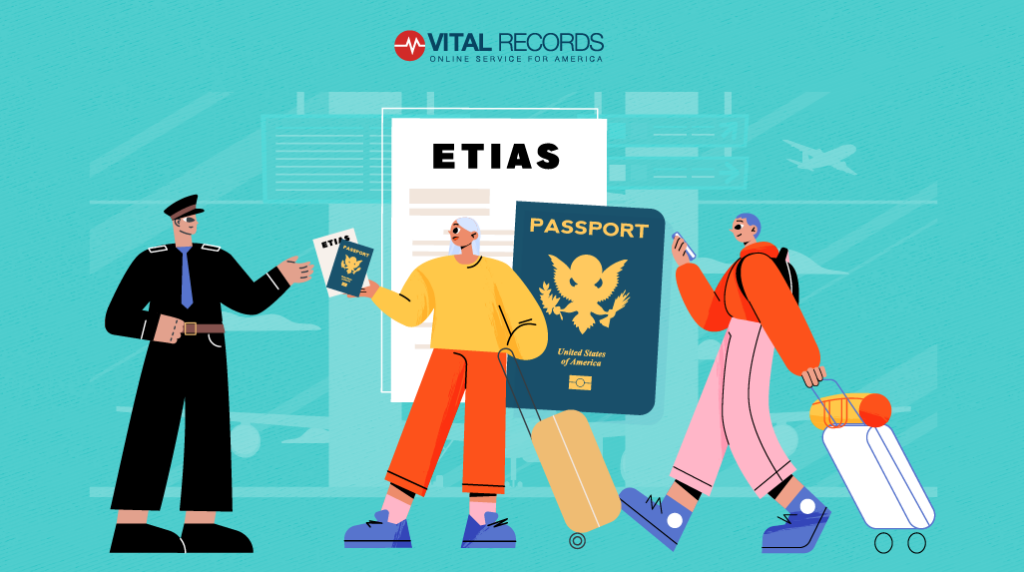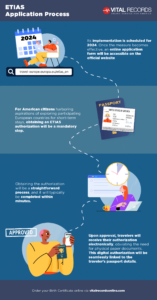In the world of travel, change is a constant. As of 2024, American citizens embarking on European adventures will encounter a new entry requirement – the European Travel Information and Authorization System (ETIAS). This transformative development marks a significant step in international travel protocols, and understanding its connection to birth certificates and passports is crucial for seamless travel experiences.
A Game-Changer in European Travel
The European Travel Information and Authorization System is an innovative system designed to enhance security measures while streamlining the process of visiting many European countries. This electronic authorization is aimed at pre-screening travelers before their arrival in the Schengen Zone, ensuring a safer and more efficient entry process. While it may seem like a novel concept, the foundation of ETIAS is rooted in established travel authorization systems like the United States ESTA (Electronic System for Travel Authorization).
Application Process
Currently, an official application form has not been introduced since its implementation is scheduled for 2024. Once the measure becomes effective, an online application form will be accessible on the official website provided here.
For American citizens harboring aspirations of exploring participating European countries for short-term stays, obtaining an ETIAS authorization will be a mandatory step. This authorization is indispensable for individuals seeking to revel in the splendors of Europe for a duration of up to 90 days.
Obtaining the authorization will be a straightforward process, and it will typically be completed within minutes. Upon approval, travelers will receive their authorization electronically, obviating the need for physical paper documents. This digital authorization will be seamlessly linked to the traveler’s passport details, thereby facilitating effortless verification by European immigration authorities.
What information is needed in order to apply?
During the application process, you will be required to furnish the following details:
- Personal Details: These include the applicant’s full name, date of birth, place of birth, nationality, parents’ names, and home address.
- Passport Information: Essential details about the applicant’s machine-readable passport or travel document.
- Travel Intentions: Information regarding the member state of the intended first entry, purpose of visit, and duration of stay.
- Background and Eligibility Queries: Addressing queries about medical conditions, criminal history, travel to conflict zones, and prior immigration or travel issues.
Moreover, individuals indicating that they have a family member who is a citizen of an EU country mandating ETIAS, or is a third-country national granted the privilege to move freely within the EU per EU law, will be requested to provide particulars concerning:
- The family member’s personal details with whom they share family ties.
- Elaboration on the nature of their familial relationship.
In cases where an application is being submitted on your behalf, the person handling the submission will need to provide their last name, first name(s), organization or firm’s name and contact details (if applicable), and a description of their association with you. They should also confirm their connection with you and assure you that they have the appropriate authorization to act on your behalf.
Application Fees
The application fee amounts to €7, with exemptions for travelers below 18 or above 70. Payment methods encompass debit and credit cards, ensuring a seamless and convenient transaction process. Successful payment (applicable to travelers aged 18 to 70) triggers the review process, culminating in a decision typically obtained within minutes.
For American citizens with protracted travel plans or distinctive objectives, a Schengen visa emerges as a necessity. This visa category accommodates those with aspirations of staying in the EU for periods exceeding 90 days or engaging in activities that transcend the scope of ETIAS.
Birth Certificates: The Starting Point for International Travel
To understand the link between ETIAS, birth certificates, and international travel, we must start with the birth certificate itself. A birth certificate is a foundational document that establishes your identity, citizenship, and vital details such as your name, date of birth, and parents’ names. Obtaining a birth certificate is often the first step in obtaining a passport, which is a crucial travel document.
Passports: The Key to International Mobility
A passport is a powerful document that allows individuals to travel across borders and experience new cultures. It serves as official proof of identity and citizenship, and it’s obtained by presenting valid identification documents, including a birth certificate. The passport application process involves verifying your identity, and birth certificates play a significant role in establishing this.
The ETIAS Link: Birth Certificates and Beyond
As we circle back to ETIAS, we find that the implementation of this system is intricately connected to the journey that starts with a birth certificate. While a birth certificate isn’t directly related, it is part of the chain of documents and processes that lead to international travel.
The Importance of Birth Certificates in the ETIAS Context
Although your birth certificate isn’t directly involved in the ETIAS application process, it plays a role in obtaining your passport. Your passport, in turn, is a prerequisite for applying for ETIAS. It’s essential to have a birth certificate to establish your identity, citizenship, and eligibility for a passport. This illustrates the interconnected nature of these documents and systems that enable international travel.
Planning Ahead for Seamless Travel
As the implementation of this new requirement approaches, planning ahead becomes paramount. Ensuring you have a valid passport, which requires a birth certificate, is the first step in this process. Having your documents in order well in advance will help you navigate the changing landscape of international travel seamlessly.
In conclusion, the implementation of ETIAS for American citizens underscores the importance of birth certificates and passports in the realm of international travel. Birth certificates serve as the foundation for establishing your identity and obtaining a passport, which in turn enables you to apply for it. Connecting these dots highlights the significance of these documents as you embark on journeys that lead to new horizons and experiences in Europe and beyond.


